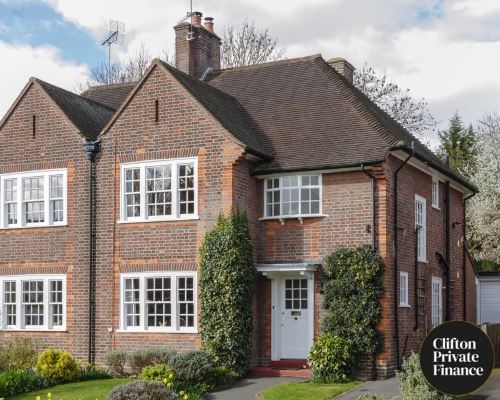Categories
100% Bridging Loan | How it Works

If you're looking for a bridging loan to cover the total amount of a property's value – you'll need a 100% bridging loan, or 100% LTV (Loan-To-Value) bridging loan.
This means you don't need to put down any deposit for your bridging loan, and can borrow the full value of the property you're buying - but, you'll need to have additional assets as security to do this at the very least, and it's not always possible.
It's more commonly referred to in the industry as '100% funding', as without other assets to 'effectively' put forward as a deposit, it's not possible.
The process for qualifying for such a bridge loan can prove difficult for many borrowers - mainly for two reasons:
- With no investment from the borrower, lenders are much more apprehensive when lending the total amount of a property in the form of a bridge loan - this means that only some lenders offer 100% LTV bridge loans.
- The criteria for a 100% bridging loan are often not easily met by borrowers – typically, lenders will need additional security on top of an initial property.
That being said, it is still possible to qualify, despite the stringent requirements.
If there are specific circumstances in place, and you manage to find the right lender willing to facilitate such a loan, then you may be able to get funding.
But how do you go about finding the right lender? What are the risks involved? And how do you qualify?
This guide explains everything you'll need to know about 100% bridging loans and how to get one.
Written by: Sam O'Neill & Sam Hodgson
Skip to:
Can I get a 100% bridging loan?
Should I get a 100% bridge loan?
What are the risks of a 100% bridge loan?
How to get a 100% bridge loan?
What do I need to qualify for a 100% bridge loan?
How much will a 100% bridge loan cost?
Need advice with 100% bridging loans?
Can I get a 100% bridging loan?
In short, yes, you can. However:
- You’ll need additional assets (usually property) to secure your loan against
- You’ll probably need a broker to help you find a willing lender (the lending pool is much smaller)
- It will likely be more expensive due to the added risks to the lender
Even with all these factors, it’s not guaranteed you’ll be able to get 100% bridging loan funding – it depends on the exact circumstances of your case.
I.e., what type of property are you buying? Where is it located? What is your exit plan? How reliable is your exit plan and what are the risks? How much do you need to borrow? What kinds of assets can you put up as security and how easy would they be to sell? And more…
To get a definitive answer, we recommend you have a chat with one of our bridging loan advisors. They can take a holistic look at your situation and give you an idea of whether you’ll be able to raise 100% funding.
Should I get a 100% bridge loan?
First and foremost, you need to consider whether a 100% LTV bridging loan is right for you - this will depend on your financial situation and the loan.
Here is a brief overview of essential things to consider beforehand:
- Can you repay the loan? – Bridge loans are short-term loans designed to be repaid within a certain term.
Due to the shorter terms, bridge loans come with higher interest rates when compared to traditional borrowings that have a monthly mortgage payment.
Related: Is a bridging loan a good idea?
- What’s the long term plan? – Bridge loans help bridge a gap between a short-term financing need and a long-term financing solution.
You'll need to have a clear plan for using the funds and securing long-term financing at a later date. Will you be refinancing with a standard mortgage? Selling the property or another house you own? Or are you expecting a cash windfall like a pension payment or an inheritance?
- What is your collateral? – All bridge loans are secured by collateral, typically property or other assets. With a 100% bridge loan, you'll likely need additional collateral to secure the loan, alongside a property – lenders will require sufficient security to satisfy their concerns on risk.
- What are the terms of the loan? – When making any significant financial decision, you should carefully read the loan terms to clearly understand the interest rates, the repayment period, and any additional fees or penalties involved.
Importantly, lenders will have different criteria and terms when compared. So it is crucial to find the right lender before you apply. Speaking to a bridging loan advisor is recommended as they’ll walk you through the process, costs and risks to ensure you’re comfortable with your loan.
What are the risks of a 100% bridge loan?
Bridge loans are a helpful financing tool but can become a burden if not properly planned. With 100% bridge loans, the risks are elevated, as well as costs, so it's important to consider the implications before making a decision. You can learn about effective debt management here.
If you can repay a bridge loan, you will retain your collateral.
But fees and penalties will likely be incurred if you cannot repay your bridging loan. Your credit history will also be affected by failing to repay a loan.
When making financial decisions such as these, a bridging loan expert can help guide you through the process and advise whether seeking a 100% bridge loan is correct when considering your financial circumstances and purposes.
How to get a 100% bridge loan?
In terms of difficulty, getting a 100% bridge loan compared to one of a lower LTV can be more complex due to a couple of extra steps involved and eligibility requirements.
With some lenders unwilling to facilitate a high LTV loan, you'll need to find the right lender to offer 100% value of your collateral. It is not always advisable to approach lenders directly, as lenders prefer to work through brokerages (especially for specialist lenders offering 100% LTV).
To have a full scope of options, you may feel more confident getting bridging loan advice from a specialist. We have an expanding network of lenders we regularly work with, lenders who may be willing to offer borrowers 100% LTV loans.
Related: Our video below explains how to fix a broken property chain using a bridging loan:

Sam O'Neill
Head of Bridging
Let us do all the hard work of finding the right bridging lender for your circumstances.
We secure bridging finance for applications of all types, and we negotiate competitive lending to meet your needs and timescale.
What do I need to qualify for a 100% bridge loan?
To qualify, you'll first need to have your documentation in order. A lender must review documentation to see if you're a suitable borrower for a high LTV loan. This documentation could include the following:
- Financial statements
- Credit reports
- Tax returns
- Information on income
- Documentation of the asset(s) offered as collateral
Before you can apply, you'll also need to have a valuation done on the asset or assets you wish to use as collateral, as a lender will need to know the value and if it meets the requirements. With 100% LTV loans, lenders will often require additional securities offered as collateral to mitigate risk;– these could be:
- Additional properties
- Jewellery, fine art or other high-value items
- Cars or different types of high-value vehicles.
- An investment portfolio
When it comes to application, a bridging loan broker can help you through the process to ensure every detail is understood. You'll sign the loan agreement and receive the entire loan amount if approved.
How much will a 100% bridging loan cost?
Unlike lower LTV loans, you won't be putting down a deposit or having any equity in purchasing a property – this means you'll be borrowing the total amount for that purchase.
When borrowing 100% of the value, the costs set by lenders to mitigate risk will be higher than that of a typical bridge loan.
Higher costs will come in the form of higher interest rates or additional fees – arrangement fees, valuation fees and underwriting fees etc. which will be a percentage of the total loan amount. Due to the higher loan amount, these fees will likely be more expensive.
With a 100% LTV loan, a lender may set a higher rate for additional security and risk mitigation - this means you'll be paying more interest on the loan amount when it comes to repayment.
Lenders may offer the ability to roll up interest payments to be paid at the end of a term, as bridge loan interest can have some flexibility. Paying interest at the end means you protect your cashflow for your development project, moving costs, or any other expenses you may have during the course of your loan.
You can find more here if you want more specific information on bridging loan costs.
Lastly, a bridge loan calculator can be a great way of determining what you can expect to pay.
Need advice with 100% bridging loans?
Here at Clifton Private Finance, we can help guide you through your options, whether you're new to bridging loans or are more experienced with this type of financing.
When making any significant financial decision, especially regarding a 100% LTV bridge loan, it's always best to seek the help of a bridging loan expert. This will ensure you're getting finance at an affordable and favourable rate.
Call us today on 0117 959 5094 to see how we can help, or book a consultation with us below.


FAQs
What is the most common bridge loan LTV?
Usually, bridge loans are offered at 70 to 80% LTV; this range is the most common. Bridge loans are available at different percentages depending on the lender. Regarding 100% LTV bridge loans, lenders will need to see additional collateral.
Do banks still offer bridge loans?
No – the majority of UK banks no longer offer bridge loans. Bridge loans are only available through private or specialist lenders who provide many different bridge loan products.
What percentage do you pay on a bridging loan?
Bridging loan interest is not always paid monthly, like mortgages. It can be rolled up to paid at the end of the term. The percentage of interest you'll pay on the loan amount will depend on the lender and their criteria. This can vary from lender to lender, and interest rates are usually quoted as monthly rates, not annual – they’re more expensive than standard mortgages.










.png)

